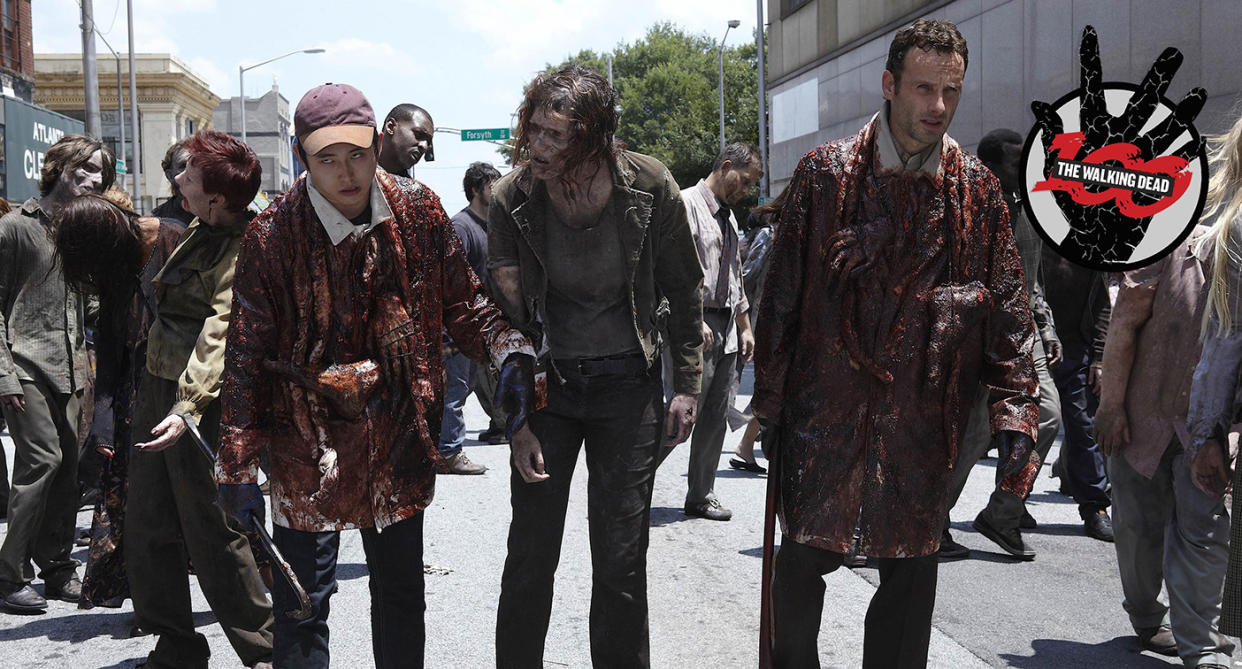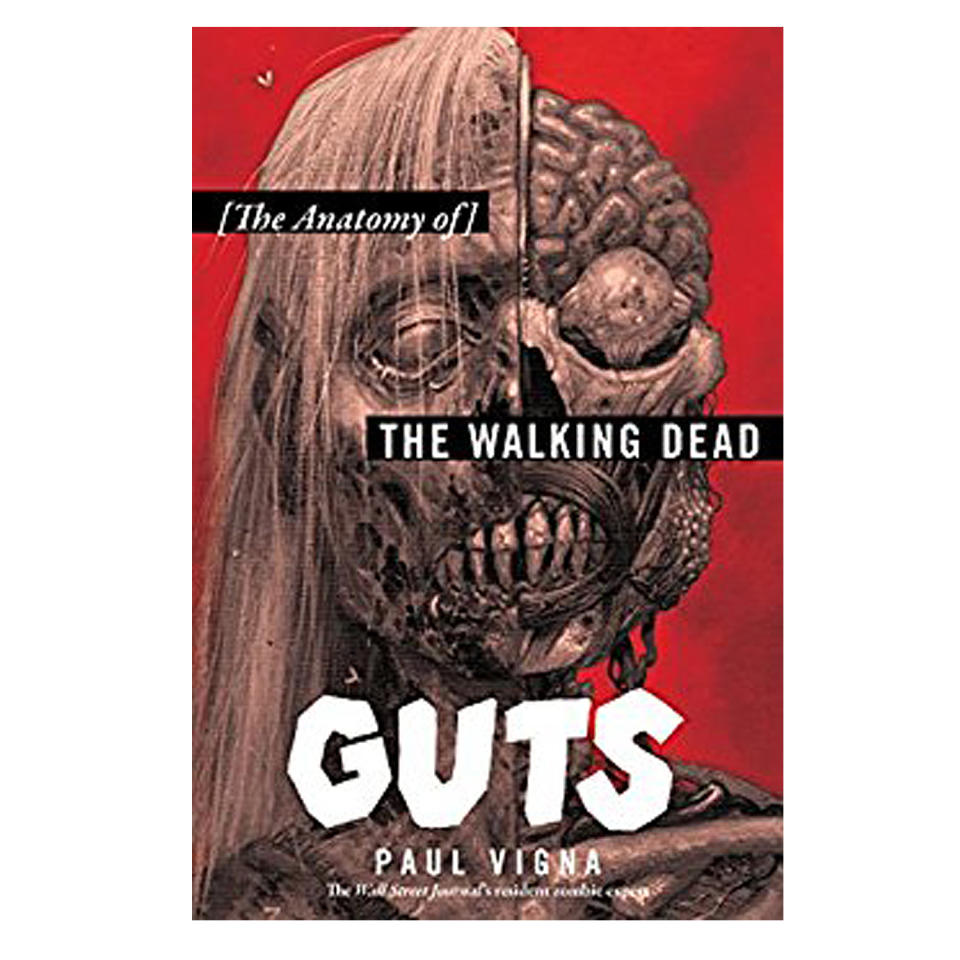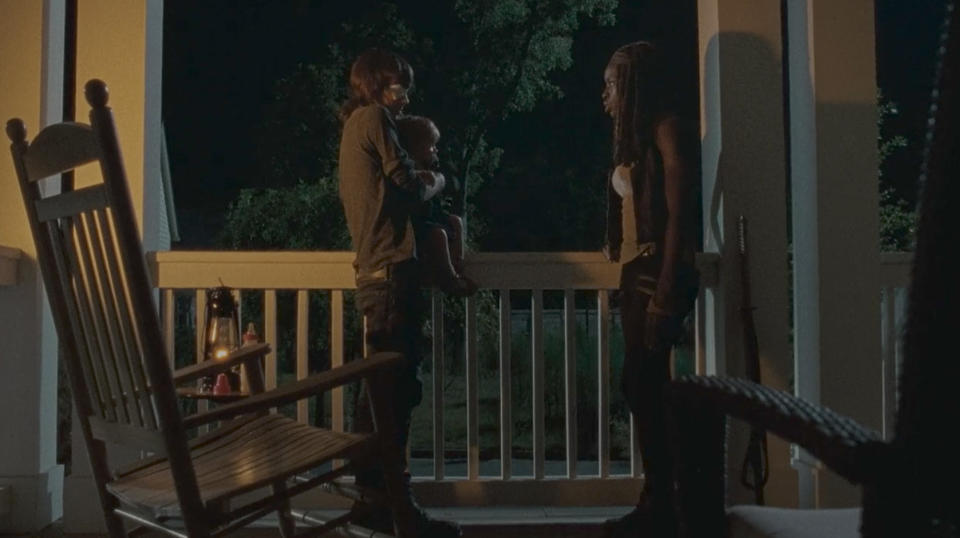'The Walking Dead': 'Guts' author Paul Vigna on which characters can't die

To celebrate the Oct. 22 Season 8 premiere of The Walking Dead — the series’ 100th episode — Yahoo Entertainment will be posting a new TWD-related story every day through the season opener.
Released today: Guts: The Anatomy of The Walking Dead, Wall Street Journal writer Paul Vigna’s deep dive on the history, fandom, and storylines of The Walking Dead.
Vigna, who writes about TWD for the Wall Street Journal, includes analysis on each season of the show, as well as chapters devoted to everything from Glenn and “Dumpstergate” to the brilliance of “No Way Out,” that action-packed Season 6 gem in which Rick and the Alexandrians fought off a horde of walkers, Carl lost an eye, Glenn officially returned, and Daryl set a lake on fire.
The author talked to Yahoo Entertainment about what sparked his vision for the book, the two major reasons he thinks fans are so drawn to the show, and why he wouldn’t necessarily riot if Daryl dies.
How did you decide which aspects of the show you would cover in the book?
Some of it was stuff that had been percolating in my head for years, as far back as 2013. I wrote an article for the Journal about how the show is resonating, given the economic times, how the aftermath of the recession, the financial crisis, left a lot of people in turmoil. I wrote about how there was something in the show that people identified with. So for a long time I had thought that there was a larger social resonance to the show. If you think about it, basically what you’re getting is a full-blown horror movie every week on television, in terms of the special effects, the cinematic vision the show has, and the creativity. I wanted to try to capture that, so I ended up trying to dedicate a chapter or two to all the different reasons I think the show works.

The show had been largely ignored by the major entertainment awards, but it does feature good writing, some amazing performances, and great character development. Which of those things do you think is the most important factor in why it does resonate so much with people?
These are not superheroes; they’re completely average people. These are completely average people for television, even. These are not trained soldiers, these are not experts, these are not geniuses, these are not politicians, or mobsters — the most equipped person given the circumstances they’re in is this guy who was an unemployed redneck, Daryl Dixon. You’ve got a small-town cop, you’ve got a battered housewife, you have a farmer, you have the farmer’s daughters, you have a pizza delivery boy. If you go down the line of all the characters on the show, at least to the ones that we even know their backstory, they’re all basically average people. In that sense, I think, there’s a resonance that people identify with these characters, because a lot of people in their own lives are often faced with situations that they are not equipped to handle.
There are a couple of things that brought that home to me at different points. There’s an anecdote I [share in the book] about being on Twitter, and writing something about Carol, just making what I thought was an innocuous comment about, “Who would have thought this battered housewife would become such a survivor?” People went nuts. The reaction to that blew me away — hundreds of people chiming in. The responses I was getting, people were like, “Yeah, of course, of course she’s a survivor, of course she’s strong.” That was one of the first times I realized how closely people were identifying with these characters.
Do you think that was strengthened by the fact that the cast was largely unknown at the beginning?
I think you’re right, because the actors and actresses were not well known, they weren’t faces you recognized, it was easier to see them as these characters. You go see a Tom Cruise movie, you’re seeing Tom Cruise. Here, you are getting characters, and you didn’t know who the actors were, so it was much easier to identify with them as normal people. I’ve spoken to a lot of the people on this show at this point, and it’s always kind of surprised me at how accessible they were, how normal they were. They don’t know if their character’s going to be killed off, and I think that brings an edge to the performances that makes it much more realistic and much more visceral.
You devote a chapter to the Walker Stalker conventions. I think anybody who really wants to understand the fandom of this show needs to attend one of those events. What was your takeaway from attending Walker Stalker?
As much as I was thinking about this stuff for years, until I went to a convention in Charlotte, none of it was really crystallized for me. Going to that convention, talking to fans face to face, seeing them interacting with the actors, getting their stories, it really crystallized in my mind why the show matters so much. The first thing that really surprised me was how many families were there. I didn’t expect it to have that kind of family atmosphere. All of the people I talked to and interviewed, they kept talking about how much the show gave them hope, and how many positive things they took out of the show, and how encouraged they were by seeing what these characters could endure, and still survive.
You start asking yourself, “People die all the time, and everybody’s miserable, and barely surviving. How do you possibly get hope out of a show that is this dark?” The answer to that question, part of it, is that the zombies are a metaphor for whatever terrible thing is going on in the world, or in your life. [George] Romero used zombies to make social commentary. Other shows have used zombies to make social commentaries. But what people didn’t understand is that taking that genre and sticking it in a weekly serial, where these characters, week after week, are put through just the most horrific ringer you can imagine. The fact that they can go through these things and survive them gives people sort of a vague template for how they can go through their own life and survive whatever trials.
You have a chapter devoted to Glenn and Dumpstergate, one of the more divisive storylines in the show’s history so far. You were not a fan. Let’s get your opinions on some of the other most-debated Walking Dead topics. Who’s the all-time best character?
Carol. I like Carol.
Carol and Daryl … will they or won’t they? And should they or shouldn’t they?
One, they should. Two, I think it’s absurd that they have not already. It makes no sense to me that at this point, they clearly have a bond, they clearly are emotionally attached to each other on some level. They are in a world where you don’t know if you’re going to be living from hour to hour — at some point you would give in to your feelings and do something. So, yes, they absolutely should.
Daryl dies, do you riot? Do you stop watching the show?
Depends on how they do it. If they write a great death for Daryl, I could live with that. I’d be sad, I’d be upset, he’s a great character, but I could live with that. If they wrote a really bad death for him, a poorly handled one where it’s obvious they’re killing him just for the shock value, I would riot. Like, I think they killed Beth just for shock value — I think they needed somebody to kill. Her death made no sense. I didn’t like it. If they did a Daryl death like that, I would be mad.
Is there any character you think cannot be killed off?
I think there’s one character who they could not kill off, and it’s Judith. I don’t think even these writers have the stones to kill off a baby — not that baby. Even for this show, I think that would be too much for the fans to take. Even though, in the comics [Judith dies]. On television, it’s different; I think people would just be so turned off by it.

Who do you think has been the best villain?
The Governor. Although Negan, I have to say Negan is growing on me. I don’t read the comics. I never read ahead in the comics because I don’t want to know what’s coming. So, for years people are saying to me, “Wait until Negan gets here, wait until Negan gets here” … so yeah, I was kind of a little biased against Negan when he first appeared. Then it was such a crazy entrance, but Jeffrey Dean Morgan does great with it. They almost force him to ham it up a little bit, but he’s so good. They give him so many good lines, so he’s growing on me.
How do you think the show will end?
I sketched out my vision for the end of the show at the end of [Guts]. I think there will come a time where they win. I think we’ll have a happy ending. They will finally defeat all the zombies. They will basically kill them all off, the plague will be cured, no one else will be infected — but it will come at a point where the only people left from the show that we know are Carl, Michonne, and Judith. And I’m going to go back on what I said; I think Michonne can’t be killed, just because I think Michonne can’t be killed. Not that the writers couldn’t want to kill her for the story, I think Michonne cannot be killed. I think Carl survives because then the whole story really becomes Carl’s story. You end up realizing that you’ve been watching the whole thing through his eyes. So Carl, Judith, and Michonne will be the only characters left that we have watched all these years, but the humans will win. It’s a bittersweet ending; there’s victory, but there’s going to be a lot of pain before you get there.
Guts: The Anatomy of The Walking Dead is available now from Dey Street Books
The Walking Dead Season 8 premieres Oct. 22 at 9 p.m. on AMC.
Read More from Yahoo Entertainment:
Rock and roll legend Tom Petty dies at 66
Tom Petty: His life in photos
Tom Petty’s most iconic music videos


